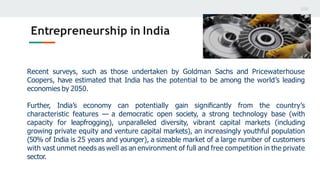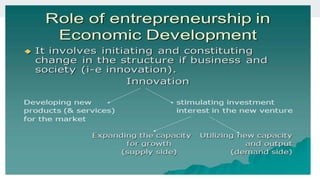Entrepreneurship day 1 knowledge.pptx
- 1. Entrepreneurship P -The revolution impact Presented by Santoshi Pawaar School of Management Studies JNTUH
- 2. Objectives of the session ● To obtain a basic understanding about the process of entrepreneurship ● To learn who is an entrepreneur fromreview of Lit. ● Walkingthrough popular definitions of entrepreneurship
- 3. Overview ‘Entrepreneurship is the professional application of knowledge, skills and competencies and/or of monetizing a new idea, by an individual or a set of people by launching an enterprise diversifying from an existing one (distinct from seeking self employment as in a profession or trade), thus to pursue growth while generating wealth, employment and social good’.
- 4. Some definitions... 1 Entrepreneurship means different things to different people. Conceptually and in practice, the term hints of no stereotypical model. Yet its very etymology – derived from the French ‘entreprendre which literally means, ‘to undertake’ it indicates the minimum characteristicsof an entrepreneur. 2 From the perspective of economic functions, three crucial characteristics of entrepreneurial activity are: risk taking, innovation and venturing into new business activities for profit.
- 5. Review of Literature Entrepreneurship has been understood to mean, among other things: ‘the ability to create and build something from practically nothing’ (J.A. Timmons, “The Entrepreneurial Mind”, 1989); ‘the creation of new economic opportunities’ (Wennekers and Thurik, “Linking Entrepreneurship and Economic Growth”, 1999); ‘creating and managing vision and demonstrating leadership’ (Wickham, “Strategic Entrepreneurship: A decision making approach to new venture creation and management”, 1998, page 34); ‘the ability to see and evaluate business opportunities’ (Meredith, “The Practice of Entrepreneurship”, 1982, page 3; see also the GEM studies that distinguish between ‘need based’ and ‘opportunity based’ entrepreneurship); ‘a practice with a knowledge base’ (Peter Drucker, ‘Innovation and Entrepreneurship’, page viii); ‘an ability to assemble or reassemble from what is available into a new kind of activity’ (Peter Marris, ‘The Social Barriers of African Entrepreneurship’, Journal of Developing Societies, October, 1968, as quoted in Thomas A. Timberg, ‘ The Marwaris: From Traders to Industrialists’, 1978, page 19); ‘the shifting of economic resources out of an area of lower productivity into one of higher productivity and yield’ (The Economist, October 13, 2007, page 18 of the special section on Innovation, quoting Jean Baptiste Say) as well as ‘an activity characterized by the goals of profitability, growth and innovative practices’ (see Joseph Schumpeter’s works generally, quoted in Kirby, supra note 1 as above, page 10).
- 6. David Kirby, ‘Entrepreneurship’ 2003, McGraw Hill, page 13; see also ‘Entrepreneurial Management: In Pursuit of Opportunity’, The Intellectual Venture Capitalist: John H. McArthur and the work of the Harvard Business School, 1980-1995 (Ed. Thomas K. McCraw and Jeffrey L. Cruikshank. Harvard Business School Press, 1999); insight provided by Mohit Malik, Innova Consulting, New Delhi; coinage of the term is also attributed to the economist Jean Baptiste Say Review of Literature
- 7. Review of Literature See McCraw et al in supra note 2 as above; see also Per Davidson, ‘Researching Entrepreneurship’, Springer 2004, page 1-3, who succinctly states that ‘researching Entrepreneurship is fun, fascinating and frustrating...one of the fascinations is the richness of the phenomenon, which leads to one of its greatest frustrations, namely the lack of a common understanding of what precisely Entrepreneurship is’. See also Abhishek Goel, Neharika Vohra, Liyan Zhang, Bhupinder Arora’ ‘Attitudes of Youth towards Entrepreneurs and Entrepreneurship: A Cross Cultural Comparison of India and China’, Indian Institute of Management (IIM) Ahmedabad paper; Goel et al summarise some of the existing approaches as follows: ‘leader manager’ (Mill, 1848; Brockhaus and Horwitz, 1986; McClelland, 1961); ‘innovator’ (Schumpeter, 1934); ‘risk taker’ (Brockhaus and Horwitz, 1986); ‘with internal locus of control’ (Rotter, 1966; as in B & H, 1986); and ‘different from managers’ (Penrose); quoting Cunnigham and Lischeron (1991), who understood the term from the following perspectives: ‘psychological’, ‘opportunity’, leadership and intrapreneurship (within organizations)
- 9. Entrepreneurship in India... Entrepreneurship has been ‘embedded in the Indian genius and is a part of its tradition’. To quote the renowned economist, T.N. Srinivasan, ‘India has been an entrepreneurial society...we had the entrepreneurial skill but suppressed it for too long a time... and now it is thriving.’ The entrepreneurial spirit is an ongoing characteristic of India’s history, particularly visible in a number of communities engaged primarily in trading. Traditionally, the Entrepreneurship of such communities is facilitated principally by the successful use of informal ‘entrepreneurial ecosystems’ and interdependent business networks. Further, there is also a rich tradition within the Indian diaspora, spanning the past several hundred years, whose spirit of enterprise is legion.
- 10. Entrepreneurship in India Entrepreneurship in India occurs in ‘far more encompassing and far reaching ways than in developed countries’, and could therefore be far more complex, ‘for there is so much more that needs to be done’ . Commentators today celebrate the ubiquitous Indian attitude of ‘Jugaad’ (a Hindi word roughly translated as ‘creative improvisation...a tool to somehow find a solution based on a refusal to accept defeat, and calling on initiative, quick thinking, cunning and resolve...to quickly fulfill market demands at the lowest possible prices as an entrepreneurial trait that has been as much a part of everyday Indian living as its rich tradition of philosophy and speculation.
- 11. Entrepreneurship in India Recent surveys, such as those undertaken by Goldman Sachs and Pricewaterhouse Coopers, have estimated that India has the potential to be among the world’s leading economies by 2050. Further, India’s economy can potentially gain significantly from the country’s characteristic features — a democratic open society, a strong technology base (with capacity for leapfrogging), unparalleled diversity, vibrant capital markets (including growing private equity and venture capital markets), an increasingly youthful population (50% of India is 25 years and younger), a sizeable market of a large number of customers with vast unmet needs as well as an environment of full and free competition in the private sector.
- 13. Economic development essentially means a process of upward change whereby the real per capita income of a country increases over a period of time. Entrepreneur plays a vital role in economic development. Entrepreneurs serve as the catalysts in the process of industrialization and economic growth. Technical progress alone cannot lead to economic development, unless technological breakthroughs are put to economic use by entrepreneurs.
- 15. Some of the roles of entrepreneurs are: 1.Capital Formation 2.Improvement in Per Capita Income 3. Generation of Employment 4.Balanced Regional Development 5.Improvement in Living Standards 6. Economic Independence 7.Backward and Forward Linkages
- 16. The role of entrepreneurship in economic development varies from economy to economy depending upon its material resources, industrial climate and the responsiveness of the political system to the entrepreneurial function. The entrepreneurs contribute more in favourable opportunity conditions.
- 17. 1.In underdeveloped/developing regions, due to lack of funds and skilled labour, the atmosphere is less conducive for innovative entrepreneurs. 2.Under the conditions of paucity of funds and the problem of imperfect market, the entrepreneurs are bound to launch their enterprises on a small scale. Also initiator entrepreneurs are preferred in such regions. Thus, initiation of innovations introduced in developed regions on a massive scale bring about rapid economic-development in underdeveloped/developing regions. 3.Further India aims at decentralized industrial structure to reduce regional imbalances in levels of economic development.
- 19. In next class…... Thank You


















